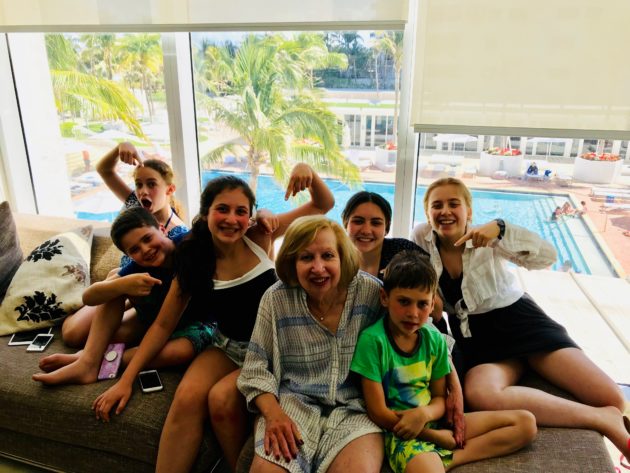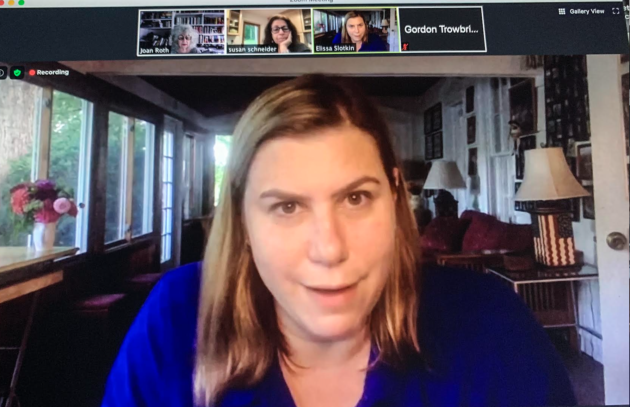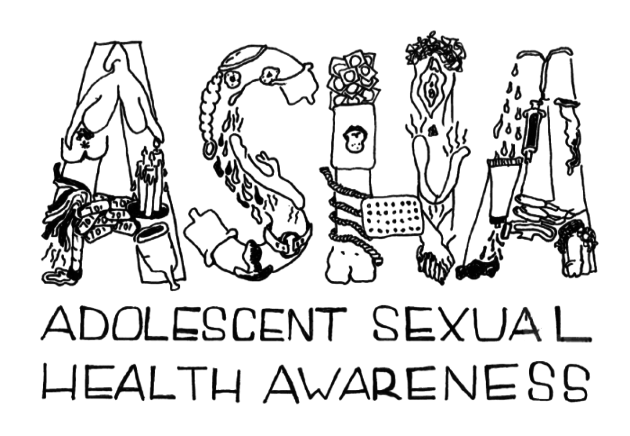The Lilith Blog
December 4, 2020 by admin
Shlomit Bukaya Takes on Racism in Israel

It’s market day in Ramla, a small city about 12 miles south of Tel Aviv, and while vendors hawk their wares to a bustling crowd of shoppers from diverse ethnic backgrounds, Shlomit Bukaya, Executive Director of the Association of Ethiopian Jews (AEJ), ponders the future for Israelis of Ethiopian descent.
“In some ways, there has been progress for our 151,000-member strong community,” the 35-year old lawyer explained in an interview in her office. “But a developed country like Israel should know how to stop discrimination.”
(more…)- No Comments
November 24, 2020 by Yona Zeldis McDonough
Life Without Lipstick
This has been the year of devastation. Just to start, there’s the staggering death toll from COVID, the collapse of the economy, the millions out of work, threatened by homelessness—and that’s not even saying a word about the savage animosity surrounding the election or the reckoning with American racism that has resurfaced in recent months.
(more…)- 1 Comment
November 11, 2020 by Yona Zeldis McDonough
A Profound Posthumous Novel from a Very Late Bloomer
What does it feel like to publish your first novel at the age of 90? That’s the question Lilith posed to Rochelle Distelheim two years ago— she was in a position to know. Distelheim, an award-winning short story writer and Chicago native, released her debut novel, Sadie In Love (Aubade Publishing), in 2018 and in addition to the Q & A that appeared on Lilith’s blog, we also ran excerpts from the novel, a warmly comical and deliciously wry story that sweeps us back to 1913 and the world of struggling Jewish immigrants in New York City’s Lower East Side.
- No Comments
October 30, 2020 by admin
Does Your Heart Need Healing?
My recent photography is about transforming objects and things in nature often overlooked. The Healing Heart poster came into being while looking at a medical model of a human heart. I saw two “hidden” entities hugging in a loving gesture of self-compassion, which expresses my coping with loss in my life.

Barbara Taff is a multidisciplinary conceptual artist who brings a sense of timelessness to her photography sculptures, cartoons and visual designs. An award-winning graphic designer and educator, Taff is author, illustrator and designer of the children’s book, The Best Colors.
- No Comments
October 29, 2020 by Abigail Fisher
A Nana for the Nation

You may remember Sarah Silverman rallying Jewish grandparents to vote blue by raving about Obama’s brisket in 2008. Silverman is far from the only one maximizing the untapped political power of Jewish grandparents. As November 3rd creeps up on us, political organizers have been coming up with new and creative ways to canvass for the Biden-Harris ticket, including the B”H meme and a “Bubbies for Biden” campaign wherein Jewish Bubbies and Zaydes from across the nation record short videos about why they’re voting for Biden. While these campaigns are important, no doubt, they ignore the grandparents who need no persuasion to help get out the vote.
My grandmother is one such example. She’s not a Bubbie for Biden, per se, but rather a Nana for the Nation. In addition to buying each of her grandchildren a Biden-Harris t-shirt, while a patient in the hospital last week she spent her time urging everyone to exercise their civic duty. As she got more than a liter of fluid drained from her lungs, 74-year-old Sylvia Fisher wasted no time spreading the word about why it’s imperative that we vote Trump out of office.
In addition to this kind of canvassing being totally badass, my Nana also felt she needed to prove her mental acuity in order to get the best care possible, a sad reflection of the state of our current healthcare system (another issue on the ballot). “I had CNN and MSNBC on the whole time so that people would know who they were talking to” she said. She didn’t let a single nurse or attending physician leave without confirming they had a voting plan. She encouraged them to check their registration and vote early. She is rumored to have convinced even a nurse from Florida to vote blue and to call three friends from the swing state urging them to do the same. After being discharged, she took every opportunity to emphasize that the surgeons who saved her life were both immigrants.
Usually it’s the grandparents who shep nachas for their children and grandchildren. But I’m awed by the strength and tenacity with which this woman is fighting for the soul of our nation, and in recent months she’s brought me tremendous nachas. If my Nana won’t even rest on a hospital bed, we can’t rest on our laurels — we all must vote.
- No Comments
October 27, 2020 by Elana Sztokman
Amy Coney Barrett and the Women Who Uphold the Patriarchy
As the world watched Amy Coney Barrett on display in the Senate judiciary hearings, I heard the sound of bewilderment erupting in many people’s heads. It’s like the noise that your Waze makes when you make a wrong turn and then she has to adjust her entire plan; it’s that scratchy sound of reconfiguring – like, something here just does not compute.
The disconnect has to do with the realization that Coney Barrett has two conflicting sides to her persona. She is on the one hand a smart, educated, competent career woman, and on the other hand also a voice–and now, a powerful force–for repressive patriarchal ideas.
- No Comments
October 20, 2020 by The Editors
Elissa Slotkin: How 2020 Looks from the Midwest

Representative Elissa Slotkin, the Democratic incumbent Member of Congress representing Michigan’s 8th District, is running a race to watch in 2020: Even Politico has profiled her in a series of articles because her district is “the sort of place Republicans figured to rule forever, the sort of place Trump won comfortably (by 7 points, to be exact) and the sort of place where a suburban realignment to the left could ensure not only a Democratic grip on the hard-won House seats of 2018 but a Joe Biden blowout across the battleground map of 2020..”
Slotkin, with multiple cultural and political tightropes to walk and a formidable political savvy, is also a former Lilith cover star. With the election, the pandemic, and the rise of white supremacy weighing heavily on everyone’s minds, Lilith’s Editor in Chief, Susan Weidman Schneider, and photographer, Joan Roth, hopped on Zoom with Slotkin to talk about some of the most intense topics of 2020.
Lilith: The “Proud Boys” are new to national consciousness–but you’ve been dealing with them for a while.
Representative Slotkin: They’ve protested in my town, Lansing, Michigan, and in many, many towns around here. They’re very open, they’re wearing motorcycle vests that say Proud Boys embroidered on the back. They’ve even provided security at some Republican events!
One of the things that I’m worried about is that the president though his leadership has fomented a lot of folks who are ready to take up arms at his suggestion. People who have seen their views normalized by the commander in chief. So to be a Jewish candidate running right now, in 2020, is very different from the last time I saw you, in 2018.
Lilith: What has been different? How have you experienced antisemitism?
E.S.: There’s a normalization of hate, a permissiveness around antisemitism that has grown, so that people commenting on Facebook pages are alluding to my being a Jewish candidate. There are memes being put out by the man I’m running against that are for me really right on the line of antisemitism, with me holding money bags and Slotkin spelled with a dollar sign.
My opponent will not denounce the Proud Boys. He will not denounce these hate groups. It’s one of those things where you know if the ADL and the Southern Poverty Law Center label you a hate group it should be really easy for any candidate around the country to denounce that hate, especially now, and the fact that they won’t shows how normalized and how concerned they are about not offending those folks.
Lilith: How has this affected your Jewish supporters?
E.S.: In my district, I have about 4,000 Jews, a small Jewish community of East Lansing. The majority of Jewish Michiganders are closer to Detroit than I live, I live on my family farm. I grew up in the Jewish community of suburban Detroit, my parents still live here, so we have really strong ties. They all think of me as their daughter. Right before Covid. I brought in the Attorney General, I brought in some senior FBI folk from Michigan, and the ADL for events, because we’ve seen a fourfold increase in antisemitic events in Michigan. It’s spraypainting of swastikas outside of cafes run by more progressive people, the destruction of a sukkah outside of Michigan State Hillel. It’s a series of things; they aren’t violent, but what the FBI really told us about is a ladder of escalation. And when you add to that the conspiracy theories that have now been mainstreamed about Jews, that have literally led to violence in Poway and Pittsburgh, it’s just a different tone and feeling out on the campaign trail.
Lilith: How do you see your role as an elected leader in the wake of the George Floyd protests?
E.S.: There is something new for me. After the murder of George Floyd—and the reaction among our African American community, among the white communities, rural communities in Michigan where people held peaceful protests in small farm towns, all-white farm towns— I felt people were absorbing this message that there is systemic racism, and it’s important to be anti-racist. So one of the things that I’ve been asked to do––by both people of color and people in white communities who know no people of color––is to use my convening authority as a member of Congress to bring groups together who wouldn’t otherwise sit in the same room. And it has now been such a steady drumbeat of people asking me that I’m setting myself up to be trained on how to facilitate these conversations in a healthy way.
Lilith: What changed for you in dealing with racism?
E.S.: One of my best friends is an African American man I went to high school with who’s now the head diversity officer for Ralph Lauren. I was telling him how people from the African American community wanted to engage with people from all-white communities. How Black entrepreneurs wanted to talk to the Michigan Banking Association, and vice versa. I kept saying to him, “I think I need to find someone I can introduce them to so they can have that facilitated conversation.” And he really pushed me to be that someone: “I would say in 2020 this is now part of the job description for a Member of Congress, or anyone in elected leadership––to bring people together who want to deal with the pain and division in their communities and are looking to elected leaders to help that happen in a safe way.”
So it’s new. It’s not like I was trained in the national security world to do this! Not at all. I want to just put it on peoples’ radar, because I think it’s one of the real, substantive outcomes of the whole movement that happened after George Floyd was murdered, and it has really changed my approach to my job.
Lilith: You were on Lilith’s cover back during the last election cycle. What response did you get?
ES: I will always remember you guys because you were my first cover! I get calls from someone vacationing in Oregon: “I went into this lovely bookstore, and there’s your face, staring at me!” We remember you all fondly on our team as being our first breakout publication.
- No Comments
October 15, 2020 by Chanel Dubofsky
Connecting Jewish Tradition with Black Fugitive Legacies
This autumn, the parking lot of the Halcyon Arts Lab in Washington DC hosted a special sukkah built by visual artist Jessica Valoris. Though its materials—recycled cardboard, paper, bamboo and plant materials—are all things you might expect to find in your average sukkah. this one is anything but; it’s a structure that confronts the past and present, invites us to engage with possibilities of the future. Lilith spoke with Valoris about creating, Black fugitivity, spirituality, and more.





- No Comments
October 13, 2020 by Aileen Jacobson
Old and New Wives’ Tales

Can you imagine a movie titled “The Artist’s Husband” about a man who abandoned his own budding career as a painter so he could cater to his wife’s needs and help her achieve fame and fortune? Or a book and a movie titled “The Husband,” about a man who goes far beyond secretly editing his wife’s books so she can enjoy literary acclaim—and, oh, also sleep with many other men? And how about the spouse of a woman in a high government position who writes an autobiography that in part examines his cascade of decisions that subordinate his life to hers? Let’s call it “Not Becoming.” And then there is the television tale of the Hasidic husband who has to run away from his wife and his community to fulfill his desire to make music and to control his life. Well, that might still be called “Unorthodox.”
These gender-reversed summaries of recent works in different genres illustrate how unlikely it is that someone would write or film anything like them—unless meant as a satire. However, the just-released movie “The Artists’ Wife,” the book and movie “The Wife,” Michelle Obama’s memoir “Becoming” (non-fiction) and the television series “Unorthodox” are each serious and thoughtful examinations of the evolving role of a wife (at least in households that are artistic, educated and financially stable). Each offers at least a glimmer of hope that the role is changing. But put “husband” in place of “wife,” and you notice that our society still has a long way to go toward equality in marriage.
(more…)- No Comments
October 13, 2020 by Abigail Fisher
What Amy Coney Barrett Means for Sex Ed

Middle schoolers are not well known for being comfortable and open when it comes to talking about sex. On my college campus at Wesleyan University, I belong to a group of students working to change this. Adolescent Sexual Health Awareness (ASHA) reinvents sex-ed curricula to go deeper than what most states require. Our mission is, in part, to “empower young people to be active participants in their sexual education and to take charge of their bodies, as well as their emotional and physical health.”
- 1 Comment
 Please wait...
Please wait...